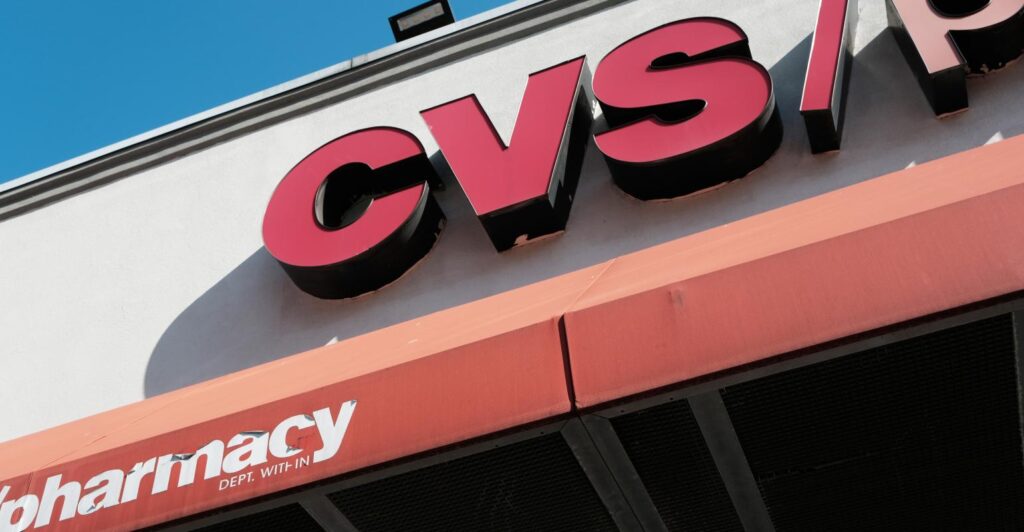Drugstore retailer and healthcare services provider CVS Health lowered its outlook for profit growth in 2024, citing ongoing pressures in the healthcare benefits segment of its business.
In the first quarter, the company said its overall operating income fell 34.1%, to about $2.27 billion, while revenues were up 3.7%, to $88.4 billion. For the full year, the company said it expects adjusted earnings per share of at least $7, down from previous projections of at least $8.30.
The company’s stock plunged more than 16% by mid-day on Wednesday after the report.
“The current environment does not diminish our opportunities, enthusiasm, or the long-term earnings power of our company,” said Karen Lynch, president and CEO of CVS Health. “We are confident we have a pathway to address our near-term Medicare Advantage challenges.”
Amid rising pressures from increased benefits and liabilities, the company is exploring increasing pricing for premiums in its healthcare benefits segment, which includes its Medicare Advantage and Aetna insurance offerings. It is also looking at exiting from some counties where the benefits business is unprofitable, Lynch said in a conference call with analysts.
The company said operating income in its benefits segment was down 59.9% to $732 million for the three-month first quarter, which ended March 31. CVS attributed the decline to increased Medicare utilization, the unfavorable impact of the previously disclosed decline in the company’s 2024 Medicare Advantage star ratings, as well as unfavorable year-over-year comparisons.
Revenues in the benefits segment were up 24.6% in the first quarter, however, which CVS attributed to growth in its Medicare and commercial insurance product lines, an increase in net investment income, and improved fixed cost leverage due to membership growth.
Lynch also said the company’s visibility into its financial performance during the quarter was impaired by the cyberattack on Change Healthcare, which provides revenue and payment services for several healthcare companies.
“As we closed the quarter, it became apparent we were experiencing broad-based utilization pressure in our Medicare Advantage business in a few areas,” Lynch said, citing outpatient services and supplemental benefits, as well as new pressures in the inpatient and pharmacy categories.
Retail pharmacy segment posts gains
The company’s pharmacy and customer wellness segment, meanwhile, recorded a 3.8% increase in adjusted operating income for the first quarter, to $1.18 billion, on a 2.9% gain in revenues, to $28.73 billion.
CVS said the revenue gains were primarily driven by increased prescription volume, including increased contributions from vaccinations, partially offset by the impact of recent generic introductions, continued pharmacy reimbursement pressure, and decreased sales in front-of-store categories. The front-of-store sales decline was due to the impact of a decrease in store count and lower contributions from COVID over-the-counter (OTC) test kits, CVS said.
The company reported that same-store pharmacy sales increased more than 7% vs. the first quarter of last year, and same-store prescription volumes increased by nearly 6%. Same store front-of-store sales were down by about 2%, but up 1% when excluding the OTC COVID test kits, said Tom Cowhey, chief financial officer, during the call.
The company said its new, simplified pharmacy pricing models, CVS CostVantage and TrueCost, have garnered strong interest, and Lynch said CVS is in discussions with pharmacy benefit management companies (PBMs) to roll out CVS CostVantage for commercial contracts on Jan. 1, 2025. As previously reported, CVS has also signed CostVantage agreements with multiple third-party discount card administrators that became effective on April 1.
The company’s health services segment, which includes its PBM operations, reported a decrease in adjusted operating income of 18.9%, while revenues fell about 9.7%, to $40.29 billion. CVS attributed the declines in part to the loss of a large client in the past year.


